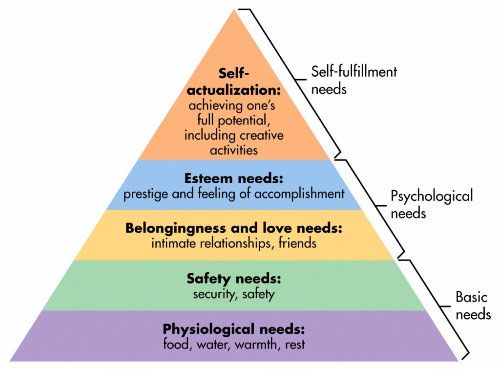-
Chapter 24: THEORIES OF MOTIVATION
Introduction to Motivation
Psychological process which energizes and activates individual to achieve his formulated goals.
Types of Motivation theories:
- Content: What motivates people at work ? It is concerned with needs and drives that people have and how these needs and drives are prioritised.
- Process: How motivation occurs? Identifies variables that go into motivation and their relationship with each other.
Theories of Motivation
Traditional Theory
Assume only economic factors to motivate. Thus people produce more by working harder when adequate material rewards are available and when there is strong fear of punishment in case of non performance. This theory was criticized due to over simplification, under estimation of human motivation and neglect of socio psychological factors.
Maslow's Hierarchy of needs:

Human needs are arranged in a high to low manner. Humans satisfy a particular need starting from lowest once fulfilled he moves to the next. The urgency of a satisfied need decreases and another unsatisfied one emerges.
He also said that satisfaction is a relative term and emergence of needs is gradual not sudden. Hierarchy isn't rigid , needs aren't watertight. Thus human needs are interdependent, interrelated, overlapping, human behavior is multi motivated.
Critics:
- Human needs don't conform to a hierarchy.
- Concept of self actualization is vogue, loose, inadequate.
- Research of others suggested two needs i.e. deficiency needs and growth needs.
- Can't be used by managers in practical situations to make workers productive.
- No correlation between satisfaction of one set of needs and activation of others.
- Theory helps in predicting human behavior on low to high probability but not on absolute terms.
Herzberg's Two Factor Theory - Motivation and Hygiene theory
Motivators are related to nature of work and intrinsic to the job itself. They are effective in motivating the individual to superior performance, efforts. Thus their absence doesn't cause dissatisfaction but presence leads to satisfaction.
Hygiene factors are related to work environment. They are related to peripheral aspects of job so are extrinsic to job. They don't motivate person to do better but work to prevent job dissatisfaction.
| Motivators / Satisfiers | Dissatisfiers / Hygience |
| Achievement | company policy |
| recognition | supervision |
| work | salary |
| responsibility | relation with superior |
| advancement | work environment |
| growth | relation with peers, personal life, relationship with subordinates, status, job security |
Thus they cause dissatisfaction with their absence while their presence doesn't bring satisfaction. As per Herzberg man's basic needs are:
- Animal - Adam: Avoidance of pain from environment
- Human Abraham: Seeking growth from tasks.
Summary:
- Factors producing job satisfaction are different from those causing job dissatisfaction.
- Opposite of job satisfaction isn't dissatisfaction but no job satisfaction.
- Similarly opposite of job dissatisfaction isn't job satisfaction but no job dissatisfaction.
Classification of people in an organization:
| Hygiene Seekers | Motivation Seekers |
| Motivated by nature of environment | nature of task |
| chronic, heightened dissatisfaction with various aspects of job context | high tolerance for hygiene factors |
| over reaction with satisfaction on improvement in hygiene factor | less reaction |
| less satisfaction from achievement | high satisfaction |
| shows little interest in kind , quality of work he does | enjoys his task |
| doesn't profit from experience | profits professionally |
| short satisfaction if hygiene factors improved, over reaction if hygiene factors not improved | same satisfaction if hygiene factors improved but mild discontent if not improved. |
Critics:
- Respondents of survey asked only extremes in satisfying or unsatisfying causes.
- No control to maintain consistent evaluation by raters.
- Ignored situational variables.
- Ignored productivity, looked only at satisfaction.
| Maslow |
Herzberg |
| Emphasized that both lower, higher order needs motivate people | Higher needs motivate, lower needs neutralize dissatisfaction |
| universal applicability | only white collar professionals |
| descriptive | prescriptive, also focus is on job enrichment not enlargement i.e. not more tasks but increase in their depth so wanted high autonomy, accountability, responsibility in planning, execution, evaluation of job. |
| general motivation is dealt with and applies to all sections of the society | work related motivation only |
| only financial rewards motivate | other motivating factors are present. |